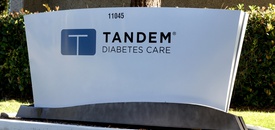Dive Brief:
- FDA on Friday authorized the third and final type of diabetes management technology necessary for a fully interoperable, automated insulin dosing system.
- The De Novo clearance went to Tandem Diabetes’ Control-IQ glycemic control algorithm, which is designed to in part use blood sugar readings from an integrated continuous glucose monitor to properly adjust insulin delivery from a similarly interoperable pump. The company touts the dosing software as the first to deliver automatic correction boluses of insulin if blood glucose levels are predicted to exceed a predefined threshold.
- It’s the latest move by FDA to encourage more choice in the management of diabetes via a new premarket review structure that considers the pieces of an automated insulin dosing system separately, rather than under a single umbrella manufacturer.

Dive Insight:
Until now, the only hybrid closed loop, or artificial pancreas, system authorized by FDA has been Medtronic’s 670G, an entirely Medtronic product granted premarket approval in September 2016.
But gradually, the agency has cleared individual pieces of an automated insulin dosing system that could be paired with similarly interoperable devices from other manufacturers. Each of those pieces was reviewed through the De Novo path, allowing future interoperable devices for diabetes management to be cleared via the 510(k) process.
Dexcom won De Novo clearance in March 2018 for its G6 device, establishing the integrated continuous glucose monitor (iCGM) category. In February, Tandem became the first manufacturer with an FDA-designated interoperable insulin pump, creating the alternate controller enabled (ACE) pump classification. And Friday, FDA rounded out the new regulatory paradigm with the authorization of Tandem’s Control-IQ as the first interoperable automated glycemic controller.
An iCGM, ACE pump, and interoperable automated glycemic controller, when combined, are what FDA considers a complete automated insulin dosing system.
The technology is backed by an NIH-supported study published in The New England Journal of Medicine that found people using the Control-IQ system experienced 71% time in range per day on average, compared to 59% in a control group not on closed-loop therapy. Diabetes nonprofit JDRF helped fund clinical testing of Control-IQ, and president Aaron Kowalski in a statement Friday called the FDA nod “a huge win” for people with Type 1 diabetes and ” yet another reason why health plans should cover all FDA authorized diabetes management tools.”
Other companies have already looked to take advantage of the new paradigm. Insulet received ACE pump designation for its Omnipod Dash insulin pump in September. Abbott is seeking iCGM designation for its FreeStyle Libre 2 device, still under review by FDA. Tandem and Abbott announced in October they plan to develop and commercialize integrated glucose sensing and insulin delivery technologies, but offered few details on the intended products or timelines from such a partnership.
Tandem said it will begin shipping new pumps functioning with Control-IQ by the end of January, and all in-warranty current pump users will be able to upgrade to the technology during that time as well. The algorithm is currently allowed for use in people 14 years and older.
Tandem will also continue to support its existing Basal-IQ software. Whereas the existing technology is designed to prevent low glucose, Control-IQ is made to predict blood sugar levels half an hour in advance and increase, decrease or suspend insulin dosing accordingly. The algorithm can also deliver correction boluses if blood sugar levels are expected to exceed a certain threshold. Tandem also built in optional settings for sleep and exercise “that will change the treatment values to better match the different physiologic needs during these activities,” the company said.
Analysts at Cowen called Control-IQ “amongst the most anticipated pump product launches ever.” During its third quarter earnings call, Tandem executives attributed a slight pause in U.S. pump purchases to patients wanting to wait for the launch of Control-IQ to switch to a Tandem pump. Shares in Tandem rose more than 5% following the news.
